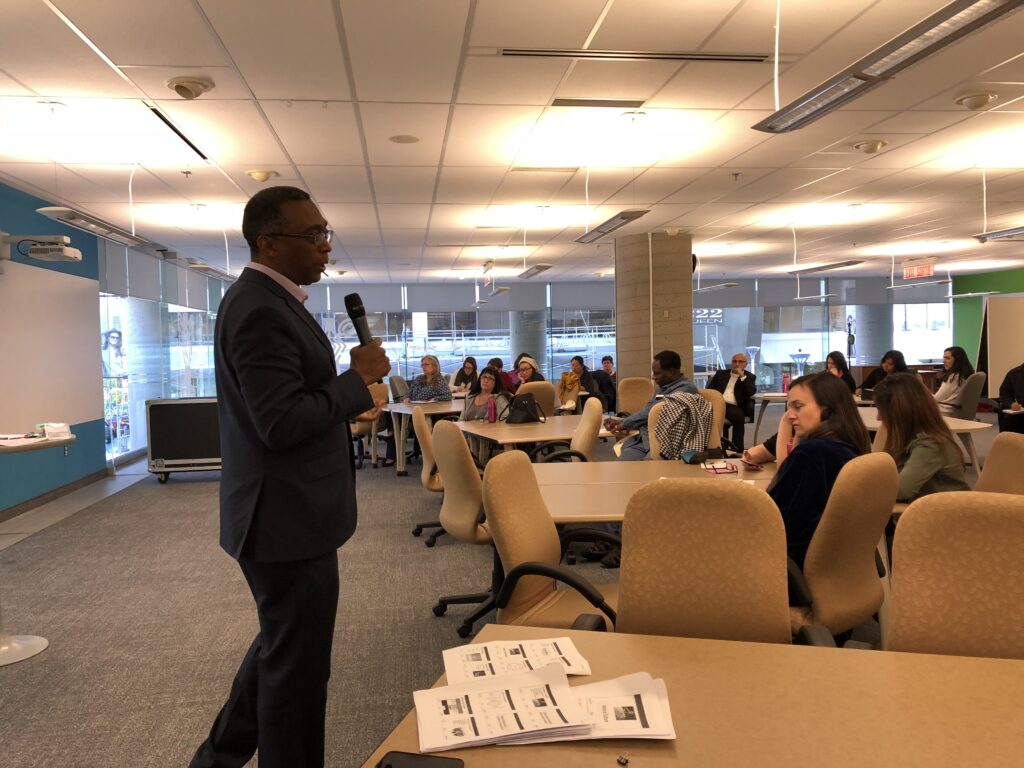SSHRC 2021 Knowledge Synthesis Grant
Transforming Work in the Digital Economy
The impact of digital technologies on work innovation and worker engagement
Table of Contents
About the Project
Digital technologies have profoundly transformed how we function in society and organizations. They have become indispensable to life in all sectors of the economy. These technological advancements, leveraging high-speed networks, have created fundamental shifts in how, when, where, for, and with whom we work. Such fundamental changes in the nature and arrangement of work reframe the definition of employment and people’s relationship with organizations. They are changing organizational life’s spatial and temporal geography, allowing people to work from anywhere, at any time, with whom they need to. These changes have profound positive and negative effects on the constitution and configuration of work and how people engage with and carry out work. In this report, we synthesize research focusing on the impact of digital technologies on work and worker engagement. Applying topic modelling and qualitative content analysis, we sought to understand:
(1) how digital technologies are transforming the nature of work;
(2) how digital technologies are transforming workplace practices;
(3) the effect of digital technologies on social networks and relationships in the workplace;
(4) how and to what extent these new work arrangements affect employee engagement and the meaningfulness individuals find in the work they do;
(5) the implications of digital technologies for the future of work.
Key Findings
Using topic modelling, we generated research findings relating to the follow ng five themes:

- Digital technology platforms and the changing nature of work. Digital platforms, profoundly, are changing how people work, what they do for work, where they work, when they work, for and with whom they work. Crowd-work and work-on-demand systems afford self-employment and time management autonomy, enhancing flexibility. Digital platforms employ complex and invisible algorithms to manage and control work supply and demand dynamics and monitor and evaluate work performance.
- Digital technological affordances and the transformation of workplace practices. Three major work processes have been shaped significantly by digital technologies, namely, 1) organizing work and hiring workers, 2) communication and collaboration within and across organizations, and 3) performing knowledge work. Digital technologies, in addition, are embedded in knowledge work practices and support the knowledge workers need for autonomy, mobility, flexibility, control of ambiguity and complexity, enabling them to engage in productive work practices.
- Effects of digital technologies on social networks and relationships at work. There is no consistent conclusion regarding the impact of digitalization on the social structure at work. While some researchers find that digital technologies positively impact social relationships and networks and enhance employees’ power in workplace social structure, other research finds that digitalization negatively impacts power dynamics at work. The technologies can be empowering for both employers and workers at the same time. While algorithms embedded in platforms give managers advanced powers of control and surveillance, they can also enhance the power of individual workers to respond to such oversight, reducing their impact.
- Digital technologies, experiences, consequences, and management. Digital technological capabilities can be both value-enhancing and value-destroying, impacting workers’ behavioural and psychological outcomes. Applying digital technologies at work may lead to information overload, challenges in time management and work productivity, and higher cognitive and time resources requirements. Digitalization can also cause adverse psychological outcomes, such as work-life imbalance, work stress, technostress, and anxiety.
- Digital technologies and the future of work. Industry 4.0 represents the digitalized workplace’s future, requiring reskilling to support work in the new era. Future management of platform work should move beyond just using algorithms for control to a more holistic application of platform logic for managing work and worker interactions. The Covid-19 pandemic has increased interest in the adoption and use of Artificial Intelligence (AI) and its application in machine learning, natural language processing, and robotics in the workplace. Security and privacy issues will continue to be very problematic issues in the future of work.
Policy Implications

Our research also suggests some implications for public policy.
- While digital technologies help workers access labour markets and earn extra money, they may exacerbate income inequality and increase precarious work. Policymakers need to thoroughly analyze the impacts of digital technologies on employment and the economy to ensure that the gaps do not widen further between those who benefit from applying these technologies in the work setting and those they marginalize.
- Policymakers need to understand what it will take to move from algorithm-based management and control to platform-based management and control. Platform-based management involves a broader socio-technical awareness of digital infrastructures and their impacts on organizations and people.
- Digital platforms have created information asymmetry and power asymmetry between employers and employees. Workers need to develop their technological capabilities relevant to the digital economy to reduce the knowledge and power gap. Organizations must invest in further education and training for platform workers to help them accumulate the new skills and qualifications necessary to cope with the rapid developments in technology.
- Given the constant growth and development of digital technologies, policymakers need to recommend investment in lifelong learning opportunities and promote collaborations between businesses, government, and educational institutions to improve digital knowledge accumulation and dissemination effectiveness and efficiency.
- Digital technology platforms are only available to those that have affordable access to digital infrastructure. The expansion of affordable and accessible digital infrastructures should be supported by policies that incentivize or drive investment in such infrastructures, reducing the digital divide between those with access and those that do not have such access.
- Advances in artificial general intelligence and related areas such as machine learning, deep learning, and robotics will radically affect jobs and work. Embracing and harnessing these technologies will require significant digital knowledge development and organizational retooling.

Events
September 21, 2021: Knowledge Mobilization Event
Transforming Work Digital Economy Presentation
Register for Future Events
Personal information collected through this form will be used and disclosed by Carleton University under the authority of the Carleton University Act, 1952, and in accordance with sections 39, 41 and 42 of Ontario’s Freedom of Information and Protection of Privacy Act. The purpose of this processing is event organization and administration. If you have any questions about the processing of personal information by Carleton University, please contact the Manager, Privacy & Access to Information, by phone at 613-520-2600 ext. 2047 or by e-mail via University_Privacy_Office@carleton.ca.
Further Information
Read the Full Report
Knowledge Synthesis Grant Final Report: Transforming work in the digital economy
Contact the Researchers
Gerald Grant, Ph.D.
Professor, Information Systems and Director
Centre for Information Technology, Organizations, and People (CITOP)
Sprott School of Business
Carleton University
Email: gerald.grant@carleton.ca
Yun Wang, Ph.D.
Postdoctoral Researcher
Rowe School of Business
Dalhousie University
Email: yn657004@dal.ca
Transforming work in the digital economy: The impact of digital technologies on work innovation and worker engagement is co-funded by the Social Sciences and Humanities Research Council and the Government of Canada’s Future Skills program », «Transformer le travail dans l’économie numérique : l’impact des technologies numériques sur l’innovation au travail et l’engagement des travailleurs est cofinancé par le Conseil de recherches en sciences humaines et le programme Compétences futures du Gouvernement du Canada.

Acknowledgement: We appreciate the photographers of the pictures used on this webpage, Anna Shvets, Annie Spratt, and Jeremy McGilvrey.